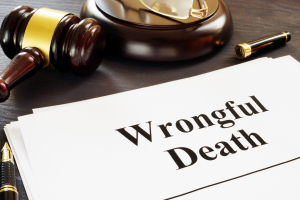
Were you recently injured in an accident that was not your fault? If so, you're probably facing multiple challenges. You may need serious medical treatment, including surgery, rehabilitation, and more. You may have to miss work. You might even need someone to help you with basic household tasks or childcare.
Those expenses add up. Depending on the severity of the injury, you could face costs of tens of thousands of dollars or even more. One way to recoup those costs is through a lawsuit. But how much is your personal injury claim worth?
The potential damages for a personal injury lawsuit in Seattle vary greatly depending on the details and circumstances. Below are some factors and variables involved in estimating the worth of your Seattle personal injury case. An experienced personal injury lawyer can help you estimate the worth of your case.

What can be used to determine the value of your personal injury lawsuit? There are many factors, but some of the most common include the following:
There are also contributing factors that can influence the value of personal injury claims, including:
Read on for more information about how these factors could apply to your case.
Each personal injury case is different. Below are some of the most common variables and factors that apply to personal injury cases in Seattle. However, there could be others in your case that need to be listed here. A consultation with a personal injury attorney can help you more precisely estimate the value of your personal injury lawsuit.

The most obvious cost of your injury may be medical bills and related expenses. It can include bills from your doctor or hospital for treatment, prescription drug costs, physical therapy or other rehabilitation, surgery, and more.
In the state of Washington, medical bills and other expenses in personal injury suits are based on the reasonable value of the services provided, not on the amount you paid. Hospitals have master cost sheets with prices for every service they provide. Those prices are used in court to estimate the value of the services you receive.
Save all documentation from your visits, prescriptions, surgeries, and other procedures. Your attorney will use those documents to develop the value of your medical treatment.
Another high cost in many personal injury cases is lost wages. You may have to miss work due to your injuries and your recovery. While your employer may be flexible for a short time, you could eventually lose wages due to your time off work.
You can include lost wages in your personal injury lawsuit. However, it would be best if you documented the loss. You can do this through reports from your employer, Form W-2, tax returns, and more.
You also need to demonstrate that you were unable to work. If there's a belief that you missed work by choice rather than by necessity, you may not receive compensation for your lost wages. Statements from doctors that say you cannot work can help support your claim and verify that you were unable to work due to your injuries.
You can also include "lost capacity" in your claim. Lost capacity is the loss of your ability to work in the future due to ongoing medical issues. It becomes essential when the injuries are severe, and you struggle with long-term or permanent challenges. Your attorney at Bungay Personal Injury Law can help you estimate your lost capacity of wages.

It's not just your health and career that can be affected in an accident. You may also suffer property loss. Automobiles are the most common property damage in a personal injury case because many incidents involve car accidents.
However, you can also suffer from other property damage, like damage to your home or work building. Again, documentation is key to this claim. Use documentation from insurance adjusters, contractors, repair professionals, and more to establish the value of this part of your claim.
Mental anguish is one of several "non-economic damages" allowed by law in personal injury lawsuits in Washington. Generally, mental anguish happens when you suffer severe mental challenges due to an accident that prevents you from performing basic living tasks.
These challenges can include depression, anxiety, post-traumatic stress disorder (PTSD), and more. Remember, mental anguish is not as easy to prove or verify as physical injuries. You will need substantial documentation and testimony from doctors, friends, family, coworkers, and more to prove your mental anguish.
Also, the state of Washington caps non-economic damages based on your annual wages and life expectancy. So while you may have significant mental anguish, pain and suffering, and more, there is a limit to how much you can seek for these damages as part of your lawsuit.

Pain and suffering are considered non-economic damage in Washington, but it's not the same as mental anguish. Pain and suffering involve physical distress. It usually involves chronic, ongoing pain that you can't quickly treat.
If the pain has caused distress in your life or an inability to complete essential functions you find enjoyable, you may be able to seek compensation. For example, perhaps the pain prevents you from playing with your kids or participating in a favorite hobby.
You can include damages for pain and suffering, but the amount is very subjective. Your attorney will rely on testimony, doctor's reports, and state formulas to estimate a pain and suffering calculation.
Loss of consortium is a subjective non-economic damage that can be challenging to estimate but is very important. Generally, the loss of consortium is the loss of benefits of a relationship.
It most commonly applies to marriages where an injury prevents one from enjoying intimate relations with his spouse. While this is a sensitive topic, it should be included in your claim if your injury has impacted your relationship. It is a genuine loss.
Your attorney will use doctor's reports, testimony from your spouse, and your testimony to develop an estimate.

As the name suggests, wrongful death claims happen when an accident causes someone's death. The deceased's loved ones can file a claim for that person's death. The damages can include both economic and non-economic damages.
You can base your wrongful death claim on medical costs to treat the person before he died, the loss of future wages, mental anguish, pain and suffering, loss of consortium, property damage, and more.
A survival action is a lawsuit that starts as a personal injury claim and transitions to a wrongful death claim. If you initially survived the accident and filed a personal injury lawsuit, this would happen.
Assume that you pass away from your injuries before resolving the lawsuit. Your survivors can continue the lawsuit as a survival action and pursue your claims even though you have passed away. All of the same damages apply to survival action suits.

Several factors can influence the amount of your claim. Keep in mind the items below are not "damages." They are factors that the court considers when determining how much money to award to the plaintiff.
Contributory negligence is the term Washington uses to determine how much fault should be applied to each party in an accident. The amount of contributory negligence applied to each party directly impacts the number of damages awarded.
For example, let's assume you got hit by another driver who was intoxicated, and that accident caused severe injuries. However, imagine that you were also speeding and maybe ran a red light at the time of the accident.
The court could find that the other driver is responsible for the accident, but you were also partially negligent in your actions. For example, they may decide you are responsible for 30% of the accident. That decision would reduce the number of damages that you would ultimately be awarded.
On the other hand, assume that you were not speeding and did not run a red light. The court may find that you had no negligence or responsibility for the accident, and the other driver is 100% responsible. In that case, the court will not reduce your damages at all.
You will likely receive at least some compensation from the defendant's insurance company. They probably will have a car, homeowner's, or personal liability insurance that covers some of your costs.
The courts will consider how much you have already received from insurance companies when determining your damages. They will deduct any money you have already received from your final awarded amount.
Many things can happen in the aftermath of an accident that can impact the number of damages. You may suffer ongoing pain, hardship, and more that increase the scope of the claim.
The defendant could face criminal charges that make the accident and the case much more severe. There's the possibility that the defendant could express his regret and attempt to make you whole before the case is decided. There are many factors that the court could consider.
These cases can often take years to get resolved. Many different things can happen in that time that can impact the case's outcome.
The statute of limitations in Washington for a personal injury claim is 3 years. You can still resolve your case after 3 years after the accident, but you have to file the lawsuit in that time.
If you file a claim within 3 years, you will likely retain any opportunity to do so.

Retaining legal representation is critical if you got severely injured in a car accident, hit by a speeding bicycle, or lost a loved one in a tragic truck accident.
To learn more about the value of your personal injury claim, schedule a free consultation with our experienced Seattle personal injury attorney at Bungay Personal Injury Law. They can review the details of your case and provide an estimate of the potential damages. Contact us at (206) 829-6791 to start the conversation and schedule your consultation.
Contact Bungay Personal Injury Law today For a Free Consultation 206-769-0093
Contact Bungay Personal Injury Law today For a Free Consultation 206-769-0093
Request A
Start your no-obligation Free consultation with us by filling out the form below and we will contact you about your case within 24 hours.
"*" indicates required fields